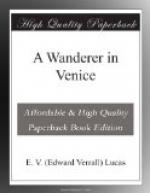Didst ever see a Gondola?
For fear
You should not,
I’ll describe it you exactly:
’Tis a long covered
boat that’s common here,
Carved at the
prow, built lightly, but compactly.
Rowed by two rowers, each
call’d “Gondolier,”
It glides along
the water looking blackly,
Just like a coffin clapt in
a canoe,
Where none can make out what
you say or do.
And up and down the long canals
they go,
And under the
Rialto shoot along,
By night and day, all paces,
swift or slow,
And round the
theatres, a sable throng,
They wait in their dusk livery
of woe,—
But not to them
do woeful things belong,
For sometimes they contain
a deal of fun,
Like mourning coaches when
the funeral’s done.
Those useful ciceroni in Venice, the Signori Carlo and Sarri, seem to have had Byron’s description in mind. “She is all black,” they write of the gondola, “everything giving her a somewhat mysterious air, which awakens in one’s mind a thousand various thoughts about what has happened, happens, or may happen beneath the little felze.”
It is pleasant to think that, no matter upon what other Italian experiences the sentiments were founded, the praise of Italy in the following stanzas was written in a room in the Mocenigo Palace, looking over the Grand Canal upon a prospect very similar to that which we see to-day:—
With all its sinful doings,
I must say,
That Italy’s
a pleasant place to me,
Who love to see the Sun shine
every day,
And vines (not
nailed to walls) from tree to tree,
Festooned, much like the back
scene of a play,
Or melodrama,
which people flock to see,
When the first act is ended
by a dance
In vineyards copied from the
South of France.
I like on Autumn evenings
to ride out,
Without being
forced to bid my groom be sure
My cloak is round his middle
strapped about,
Because the skies
are not the most secure;
I know too that, if stopped
upon my route,
Where the green
alleys windingly allure,
Reeling with grapes
red wagons choke the way,—
In England ’twould be
dung, dust or a dray.
I also like to dine on becaficas,
To see the Sun
set, sure he’ll rise to-morrow,
Not through a misty morning
twinkling weak as
A drunken man’s
dead eye in maudlin sorrow,
But with all Heaven t’himself;
the day will break as
Beauteous as cloudless,
nor be forced to borrow
That sort of farthing candlelight
which glimmers
Where reeking London’s
smoky cauldron simmers.
I love the language, that
soft bastard Latin
Which melts like
kisses from a female mouth,
And sounds as if it should
be writ on satin,
With syllables
which breathe of the sweet South,
And gentle liquids gliding
all so pat in,
That not a single
accent seems uncouth,
Like our harsh northern whistling,
grunting guttural,
Which were obliged to hiss,
and spit and sputter all.




